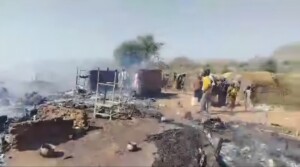Sudanese refugees return to Darfur from strife-torn Chad
About 88 Sudanese refugees who have sought asylum in Chad since the war erupted in Darfur, have arrived in Saraf Omra in North Darfur after fleeing the deteriorating security situation.
 Sudanese refugees in Chad (File photo: UNHCR / Aristophane Ngargoune)
Sudanese refugees in Chad (File photo: UNHCR / Aristophane Ngargoune)
About 88 Sudanese refugees who have sought asylum in Chad since the war erupted in Darfur, have arrived in Saraf Omra in North Darfur after fleeing the deteriorating security situation.
On Friday, Sheikh Hasan Diar Zayed told Radio Dabanga that these people were registered as refugees in the camps in El Tina.
Diar Zayed explained that the deterioration in the humanitarian and security situation in Chad, the scarcity of water and a lack of shelter has forced these people to return to Sudan.
He appealed to the local and state authorities to expedite humanitarian aid to the returnees.
In March, the government Humanitarian Aid Commission (HAC) in North Darfur reported they have registered 3,000 people who fled the recent tribal disputes in eastern Chad to the Sudanese border town El Tina.
HAC confirmed that the registration processes was carried out in coordination and cooperation with UNHCR and the International Organisation for Migration (IOM).
In a press statement at the time, Ibrahim Hamid, the state’s Humanitarian Aid Coordinator, said that his administration managed, in coordination and cooperation with the IOM, to register and classify those fleeing from Chad to El Tina.
He pointed out that the registration showed that 3,000 people fled from Chad, most of them Sudanese living in eastern Chad, but also 165 Chadian families.
Hamid said that HAC provided 70 tons of food, 1,000 plastic sheets, and a water tank for the affected people.
At the end of a visit to the Sudanese refugee camps in eastern Chad in early March, Minni Minawi, head of the Sudan Liberation Movement split-off faction, called for more aid to the refugees in Chad, especially children and women, because of their deteriorating health conditions. At a press conference in El Tina, he demanded that the Sudanese government play its role towards the refugees as Sudanese citizens.
Radio Dabanga’s editorial independence means that we can continue to provide factual updates about political developments to Sudanese and international actors, educate people about how to avoid outbreaks of infectious diseases, and provide a window to the world for those in all corners of Sudan. Support Radio Dabanga for as little as €2.50, the equivalent of a cup of coffee.












 and then
and then